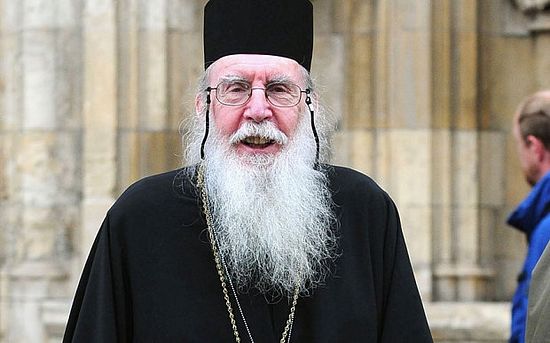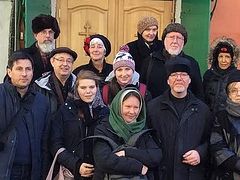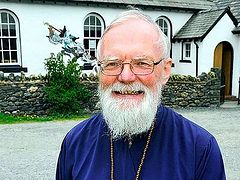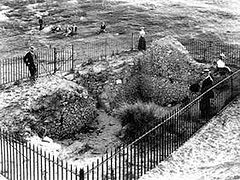Source: The Telegraph
March 27, 2016
Fr Ephrem Lash, Archimandrite of the Ecumenical Throne, who has died aged 85, was a compelling but eccentric figure in the world of English Orthodoxy, a world by no means devoid of eccentricity.
He was a lucid and precise translator and a priest-monk of humble simplicity in his daily life, with a mischievous wit. His medieval appearance – black cassock, black monastic hat (latterly a Georgian hat replete with crosses), with a beard resembling, it was once said, a rampant clematis – cloaked his enthusiasm for the latest electronic devices. On his smartphone he had downloaded the Old Testament in Hebrew and Greek, and the Greek New Testament.
Lash had many friends, but he could seem formidable. He devoted himself to translating the beautiful texts of the Byzantine liturgy, because, he would say, “not all the old ladies in my parish know classical Greek”. He was opinionated, too. Devoted to Byzantine chant, he professed to dislike Russian Orthodox music, dismissing it as “boring God in tone four”. It was, however, in his memorable book reviews that his personality was most clearly manifested, as he drew on his scholarly acumen, often with sharp humour.
He was also for many years the Orthodox representative on the General Synod of the Church of England, where he was held in great affection.
Christopher John Alleyne Lash was born on December 3 1930 in India, where his father, Brigadier Henry Alleyne Lash, was in the British Indian Army. The Lashes were a strongly Anglican family – Brigadier Lash’s father and grandfather were Anglican priests and one of his brothers, “Bill” Lash, was the bishop of Bombay. Christopher’s father had converted to Catholicism; his mother, Joan Mary Moore, was of Irish (Protestant) descent, her Catholicism of Scottish heritage, and the children were brought up as Catholics.
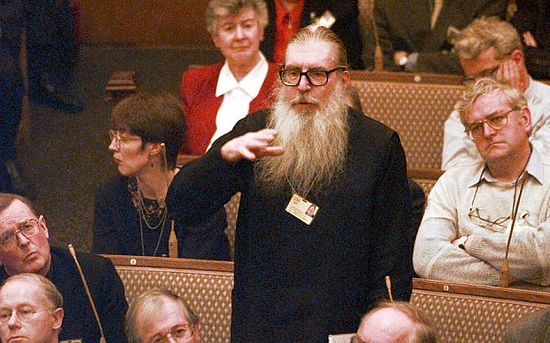 Archimandrite Ephrem Lash speaking during the Lord's Prayer debate at the General Synod, 1998 Photo: Stephen Lock
Archimandrite Ephrem Lash speaking during the Lord's Prayer debate at the General Synod, 1998 Photo: Stephen Lock
Christopher was the eldest of their four children, followed by his brother, Nicholas, who became Norris-Hulse Professor of Divinity at Cambridge, and two sisters. In 1938 the rest of his family returned to India, leaving Christopher boarding in a prep school; because of the war, he was not to see them again until 1944, by which time he was at Downside.
In 1950, after National Service in the Royal Artillery, he went up to St John’s College, Oxford, to read Greats. His undergraduate career was not academically distinguished, as he devoted much of his time to theatrical activities (his nephews, he noted proudly, were the actors Ralph and Joseph Fiennes).
Coming down from Oxford in 1954 he taught classics at the Oratory School in London, and later at the Hardye School, Dorchester. Having decided to seek ordination, he was sent by his bishop to train at the Saint-Sulpice Seminary in Paris. There he was taught by the Syriac scholar, Fr Graffin – who was delighted to find that his English student had a genuine interest in Syriac – and worked on the Syriac version of the Cathedral Homilies of Severus, a sixth-century patriarch of Antioch.
Lash acquired a thorough knowledge of French, and the syllabus at St-Sulpice included Hebrew. He also learnt Coptic, Ethiopic and Armenian and gained familiarity with Church Slavonic. While in Paris he was ordained deacon, but never advanced to the priesthood in the Catholic Church, perhaps because he and his bishop in Britain did not see eye to eye about Lash’s future.
In 1974 Lash returned to Oxford to work (as a “harmless drudge”, he said) with Professor James Barr on the Oxford Hebrew Dictionary. He found himself ill at ease with post-Vatican II English Catholicism, though he had lived happily enough through the changes in France, and began to worship at the Orthodox church in Canterbury Road, Oxford.
In 1976 he was received, as a deacon, into the Greek Orthodox Church. Two years later he was appointed to a lectureship in Old Testament and Patristics at Newcastle University. In the summer of 1979, he was ordained to the priesthood by Archbishop Athenagoras of Thyateira and Great Britain, and given the name of Symeon. He took early retirement from his post at Newcastle in 1984 and left for the Holy Mountain of Athos, where he became a monk of Docheiariou. There he was given the name of Ephrem and received the title of Archimandrite.
In 1986 Lash returned to Britain and settled as chaplain to the Monastery of the Assumption at Normanby, near Whitby, on the edge of the North York Moors. The community was soon reduced to a single nun, Mother Thekla, but Lash remained there for 10 years. Through Mother Thekla, he came to know John Tavener.
It was in this period that his endeavours in translating the liturgy flourished. His version of the Divine Liturgy of St John Chrysostom formed the basis for the official translation published in 1995. Ephrem Lash had little patience with translations in some supposedly timeless liturgical language: he used clear, elegant and accurate English. This work spawned articles on textual points, mostly in the journal Sobornost.
Among his numerous other translations were On the Life of Christ: Kontakia in 1995, and in 2009 he published An Orthodox Prayer Book. His translation of a liturgical Psalter from the Greek text of the Septuagint was nearly complete at his death.
In 2004, in recognition of his translation work, he was made an Archimandrite of the Ecumenical Throne (of Constantinople). He moved to London in 2006, where he served in a former Welsh chapel in Holloway.
Recently he had been translating the Orthodox funeral service, which was by his hand when he died.
Fr Ephrem Lash, born December 3 1930, died March 15 2016

